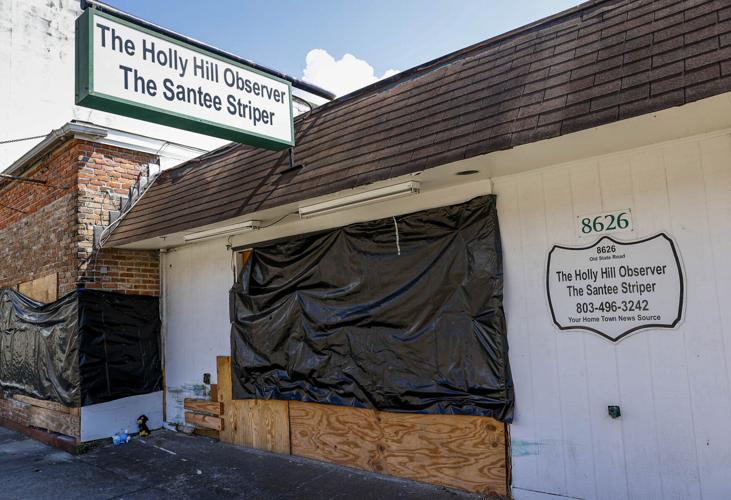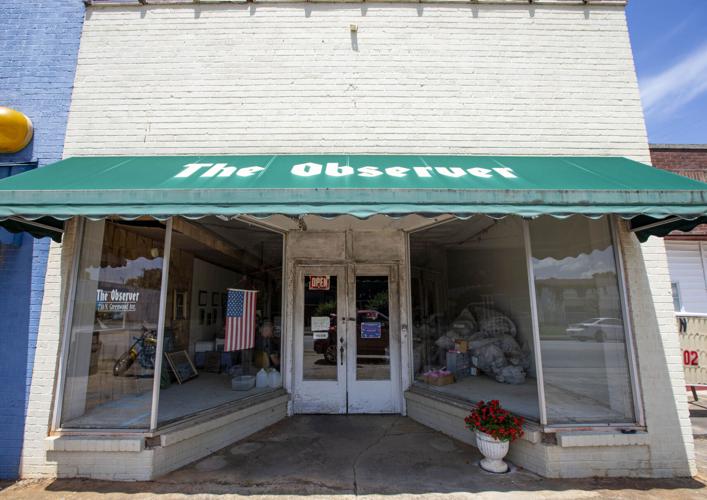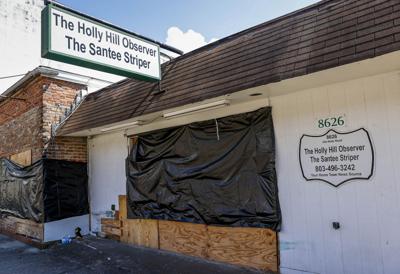Corruption is flourishing in the rural corners of South Carolina as newspapers fold or shrink coverage amid a financially crippling pandemic.
Seven of our state’s newspapers closed their doors in the past year, joining more than 60 that shuttered across the nation as the coronavirus strangled an industry already battered by shrinking revenue and draining job cuts. This only exacerbated a trend that has created so-called “news deserts” in hundreds of U.S. communities, depriving them of vital watchdogs of government and democracy.
The losses hit hardest in the vast rural stretches of the Palmetto State, in places such as Allendale County, which has struggled for years with soaring poverty, failing schools and government mismanagement.
In the past five years, the state took over the county’s problem-plagued school district for the second time while three of Allendale’s public officials went to jail on embezzlement charges. All this occurred after the county lost its lone newspaper, the weekly Allendale Sun, in 2015.
“When you lose a local newspaper, what you are losing is that person who shows up to cover the town council, the person who covers the school board and the local police beat,” said Penny Muse Abernathy, a visiting professor at Northwestern University’s Medill School of Journalism in Illinois. “At a minimum, it provides transparency about what’s going on in local government.”
Abernathy has spent years charting the growth of news deserts while a professor at the University of North Carolina’s Hussman School of Journalism and Media. Her findings have caused great alarm among advocates of open government.
It’s not just that some of these papers have been around for more than 100 years. Studies have shown that citizen engagement and voter participation drop off when newspapers vanish. A financial toll is exacted, as well, with public salaries, spending and debt rising in the absence of journalistic scrutiny, another study found.
Without that scrutiny, corruption can blossom, often in financially strapped places that are least able to afford it.
The Post and Courier examined 100 South Carolina misconduct cases in which criminal charges were filed since 2015. Roughly 75 percent involved public officials and employees accused of betraying the rural community in which they worked.
Take the Union County court clerk who pocketed more than $10,000 in child support money meant for families. Or the Kiawah Island town administrator who cut herself extra paychecks and used town credit cards to cover $7,500 in personal expenses for airline tickets, car repairs and medical appointments. Or the town clerk in the tiny Upstate town of Lyman who siphoned off $20,000 in addition to the $8,000 she racked up on town credit cards to pay for her son’s wedding and other expenses. All three were convicted of their crimes.
State Law Enforcement Division Chief Mark Keel said the public would likely be stunned by the amount of misconduct that goes on in the state. His agency has conducted some 1,400 misconduct investigations in the past decade alone.
“We have seen a lot of that sort of thing,” he said. “It may not be the highest-paid person or an employee with a whole lot of authority, but someone who sees an opportunity, whether it's embezzlement or stealing property from a city or county.”
Often, the corruption comes to light when local suspicions or complaints end up in the community newspaper, prompting someone in power to reach out to SLED for help, Keel said.
Kristine Artello, a corruption expert and professor at Virginia Commonwealth University, interviewed former federal prosecutors and investigators for a study into what triggers corruption cases and the tools investigators need for these cases to succeed.
One surprising finding: Newspapers and law enforcement often had a synergistic effect. Old-school investigators told her “they would come into the office in the morning and the first thing they did was read the newspaper and make circles in the articles, saying, 'This smells funny. I want to investigate that.' And that’s what they started with.” But as communities lose newspapers, they lose the kinds of clues law enforcement needs to make cases, Artello said.
“I know there was a belief that as newspapers decline we’re going to have citizen reporters taking their place," she said. "But most individuals are just trying to live their lives — they don’t have time to live and breathe this stuff.”

The Observer in Ware Shoals was one of several newspapers in rural communities shuttered last year. File/Andrew J. Whitaker/Staff
A crisis in local journalism
The internet greatly expanded the reach of local journalism, but it also left the industry vulnerable to monolithic companies such as Facebook and Google, which vacuumed up news content and the overwhelming share of digital revenue that went with it.
As advertising revenue plummeted and circulation withered, a quarter of the nation’s newspapers vanished in the 15 years leading up to 2020, Abernathy’s research showed. That left more than two-thirds of U.S. counties without a daily paper and more than 200 with no newspaper at all. At the same time, the number of working journalists plunged by half — a loss of 36,000 jobs. That's left some publications as “ghost papers,” or mere shells of their former selves, with decimated newsrooms and few resources left to properly cover a community, Abernathy found.
This all translates to less coverage and fewer stories, with government transparency and accountability suffering in the process, Abernathy said. And the coronavirus has only made things worse, “turbocharging” the rate of decline and closures, she said.
Last year, at least 1,800 communities around the country had no local news outlet, with most of the losses among weekly newspapers in economically struggling communities. The South, which has some of the poorest states in the country, also has the most counties without newspapers, Abernathy’s research found.
“We’re in a crisis in local journalism in this country, and it was a crisis before the pandemic came along,” said Al Cross, a former journalist who directs the Institute for Rural Journalism and Community Issues at the University of Kentucky.
South Carolina, which saw its pool of newspapers decline by 14 percent between 2004 and 2019, has only one news desert: Allendale County. But seven more papers shut down last year, diminishing coverage in the rural communities of Union, Ware Shoals, Bamberg, Santee, Holly Hill, Fort Mill and Walterboro. Two more, in Gaffney and Travelers Rest, shuttered their print operations and shifted to online-only coverage, according to the South Carolina Press Association.
“It’s a problem,” SCPA Executive Director Bill Rogers said. “Having the press monitoring government is vital in a democracy, and, unfortunately, that’s been reduced by staff cuts and closures.”

The Allendale Sun newspaper shutdown in 2015. Since then, the state took over the county’s problem-plagued school district for the second time while three of Allendale’s public officials went to jail on embezzlement charges. File/Grace Beahm Alford/Staff
Watchdogs of society
The Union Times survived the Civil War and much more in its 170 years of publication, but it couldn’t outlast the financial pressures of the pandemic, Editor Charles Warner wrote in a farewell column in September. That left this former textile community in South Carolina’s Upstate region with one newspaper, the weekly Union County News, to cover a county of 27,300 people where nearly a quarter of the population lives in poverty.

Former Union County Sheriff David Taylor was accused of sending text messages, on a county cellphone, to a resident that were inappropriate and included an obscene photo. Gov. Henry McMaster suspended Taylor in 2020. Charges are pending. Courtesy of Union County News.
Editor Graham Williams is one of just two staff members at the News, and he handles everything from covering meetings and editing copy to delivering the paper when it comes out each Monday. It can be a grind, but Williams knows that important issues would go unreported if he and his colleague, Anna Brown, the publisher, didn’t work so hard to cover all the bases.
Brown was among the first to push for documents that later exposed complaints about then-Union County Sheriff David Taylor, who was accused of sending lewd messages to deputies and asking subordinates to buy him booze on duty. The governor suspended him last year after Taylor was indicted for allegedly sending an obscene photo to a citizen.
“Our job is to be the old watchdog for society,” Williams said. “Anything can happen, and if we’re not there to watch and report on it, how are people going to know?”
About 28 miles away, Travis Jenkins carries on a similar mission in another two-person shop, The Chester News & Reporter. When he’s not covering council meetings, basketball games or the latest monster catfish to be hauled out of Caney Fork Falls, he is often busy filing open records requests and sifting through documents to track down stories.
Over the past couple of years, Jenkins has covered the indictment of the county’s administrator for allegedly selling meth out of his government vehicle, and he’s reported on the arrests of the county sheriff and two top deputies on misconduct charges. He also exposed issues with the qualifications of local judges and revealed hostilities among school officials — a scoop he nabbed after sorting through more than 5,000 of the education superintendent’s emails.
Jenkins said it can be a challenge to find the time to do these deeper digs. But he’s not sure anyone else would do it if he didn’t take that time. And then?
“The public would probably get an incomplete or distorted picture of it all from gossip and social media,” he said.
In Greenwood, another former mill city in the western portion of the state, the Index-Journal newspaper has long been known as a champion of the Freedom of Information Act and government accountability. So when Julie Wilkie was named city manager in 2018, she quickly reached out to Editor Richard Whiting to discuss open government issues and ways to ensure proper transparency.
“I believe that having a local paper is important to ensuring that local residents are informed about the matters being acted upon by their local governments,” Wilkie said.

Former Chester County Supervisor Shane Stuart (right) talks with Lewisville High School Principal Dr. James Knox at Lewisville's graduation ceremony in June 2017. Stuart, a former sheriff's deputy, was charged with selling meth out of his county car in 2020. Courtesy of the Chester News & Reporter
Costs to taxpayers
Local watchdog journalism has been a hallmark of our democracy for more than two centuries, but it is slipping away as small newspapers struggle just to keep the lights on, said Cross, of the rural journalism institute. Fewer rural communities can afford to support a newspaper these days, and the publications that remain often lack the resources to do the time-intensive deeper investigations needed to expose wrongdoing. But covering meetings just isn’t enough, he said.
“Covering a meeting is like sitting in a train station and watching trains pick up and let off passengers,” Cross said. “You might have some idea what is going on, but you don’t really know unless you get on that train, ride it and ask questions.”
Some 26 weekly newspapers around South Carolina have shut down operations since 2007. Seventeen new weeklies started up during that same period, for a net loss of nine news outlets. But numbers only tell part of the story.
A number of the new arrivals have set up shop in places that already have news outlets, providing a second or third choice for readers. But in other areas — rural communities such as Whitmire, Powdersville, Walhalla, Lake Wylie and Inman — the presses have stayed silent.
There hasn’t been a lot of academic research done on whether the lack of local news coverage fuels corruption. But researchers from Notre Dame and the University of Illinois at Chicago found that governments cost taxpayers more after newspapers closed down and reporters were no longer watching. Government salaries increased, as did the number of employees. Deficits also jumped, along with borrowing costs. The cost of an average bond issue shot up by $650,000, the researchers found.
“It was an eye-opener to me that the effects were so pronounced,” said Dermot Murphy, an assistant finance professor at the University of Illinois and co-author of the study.
The results probably wouldn’t surprise Walt Inabinet, a retired cartoonist who has worked tirelessly to attract media attention to Bamberg County, where he lives. Bamberg, the hometown of former Gov. Nikki Haley, has soaring unemployment and poverty, and the county has lost about 20 percent of its population since 1980. At the same time, it has taken on $14 million in debt to fix up the county courthouse and meet other needs — moves elected officials applaud as needed but Inabinet decries as a “slow-rolling financial disaster.”
The Bamberg Advertizer-Herald, founded in 1967, used to ride herd over the county’s leaders, but it lost much of its step after the longtime owners retired and sold the weekly to a chain in 1996, Inabinet said. The Advertizer folded last year amid the pandemic, along with its sister papers in Holly Hill and Santee.
So Inabinet regularly sends out email blasts to news outlets throughout the state, pleading with them to come investigate the concerns he and other residents have raised about the actions of their county leaders.
“Loudmouths like me accept the hell they catch and take to Facebook and other social media outlets,” he said. “We beg the outside media to the point of being annoyances to please come help us expose what we've already documented for them.”
Sometimes they take heed, such as with the flurry of recent coverage surrounding the County Council chairman’s arrest on child molestation charges. But his request for more complicated investigations into the intricate financial dealings that have fueled the Bamberg renovations have attracted few takers.
Inabinet compares himself to a lonely vineyard worker, toiling alone to collect a bounty of sour grapes from the desert growing around the place he calls home.
















